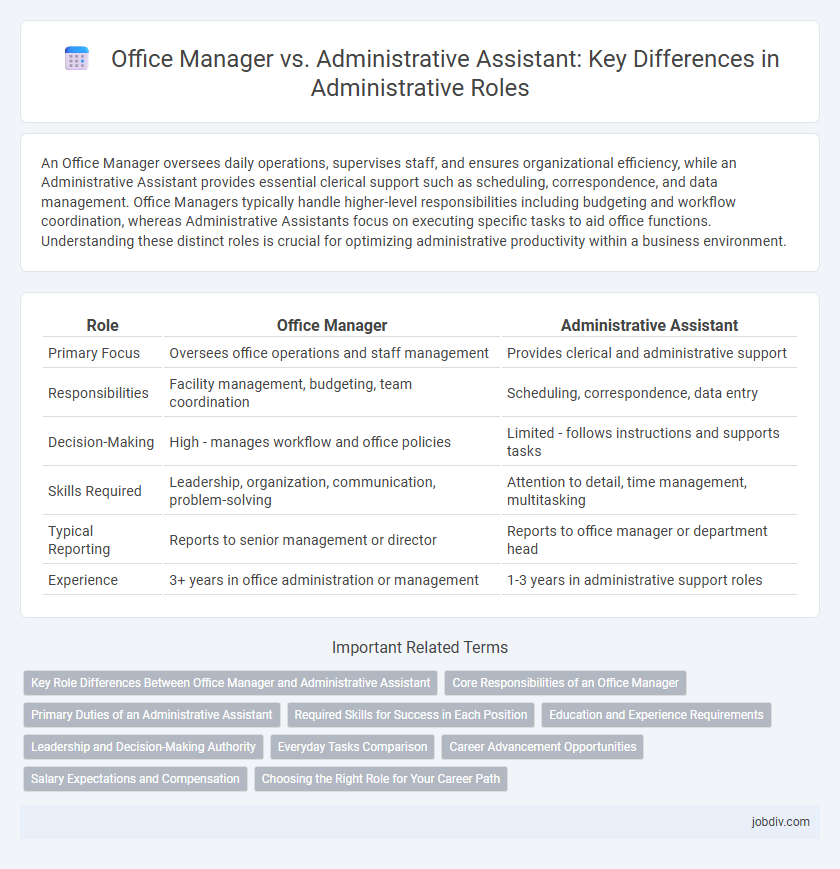An Office Manager oversees daily operations, supervises staff, and ensures organizational efficiency, while an Administrative Assistant provides essential clerical support such as scheduling, correspondence, and data management. Office Managers typically handle higher-level responsibilities including budgeting and workflow coordination, whereas Administrative Assistants focus on executing specific tasks to aid office functions. Understanding these distinct roles is crucial for optimizing administrative productivity within a business environment.
Table of Comparison
| Role | Office Manager | Administrative Assistant |
|---|---|---|
| Primary Focus | Oversees office operations and staff management | Provides clerical and administrative support |
| Responsibilities | Facility management, budgeting, team coordination | Scheduling, correspondence, data entry |
| Decision-Making | High - manages workflow and office policies | Limited - follows instructions and supports tasks |
| Skills Required | Leadership, organization, communication, problem-solving | Attention to detail, time management, multitasking |
| Typical Reporting | Reports to senior management or director | Reports to office manager or department head |
| Experience | 3+ years in office administration or management | 1-3 years in administrative support roles |
Key Role Differences Between Office Manager and Administrative Assistant
An Office Manager oversees the entire office environment, managing staff coordination, budget allocation, and operational policies to ensure efficiency. An Administrative Assistant primarily supports executives and teams by handling scheduling, communication, and document management. While the Office Manager focuses on strategic office functionality, the Administrative Assistant facilitates day-to-day administrative tasks.
Core Responsibilities of an Office Manager
The core responsibilities of an Office Manager include overseeing daily office operations, managing staff schedules, and coordinating administrative procedures to ensure efficiency. They handle budgeting, office supply procurement, and act as a liaison between departments to streamline communication. Office Managers also implement policies, maintain office systems, and support executive leadership to enhance overall productivity.
Primary Duties of an Administrative Assistant
An Administrative Assistant primarily manages scheduling, correspondence, and file organization to support executive and team productivity. They handle clerical tasks such as answering phones, preparing documents, and coordinating meetings, ensuring smooth office operations. Their role emphasizes detailed administrative support rather than strategic management responsibilities.
Required Skills for Success in Each Position
Office Managers require strong leadership abilities, project management skills, and proficiency in budgeting and resource allocation to ensure smooth office operations. Administrative Assistants need expertise in calendar management, communication, and document preparation, with a focus on organizational skills and attention to detail. Both roles demand proficiency in office software, problem-solving capabilities, and effective multitasking to support overall administrative efficiency.
Education and Experience Requirements
Office Managers typically require a bachelor's degree in business administration or a related field and several years of experience in office management or supervisory roles. Administrative Assistants often hold a high school diploma or associate degree, with experience centered on clerical tasks and supporting office functions. Both roles benefit from strong organizational skills, but Office Managers generally need more advanced education and extensive leadership experience.
Leadership and Decision-Making Authority
Office Managers hold greater leadership roles and possess decision-making authority to oversee office operations, manage staff, and implement policies, ensuring efficient workflow. Administrative Assistants primarily provide support by handling clerical tasks and managing schedules, with limited authority in decision-making or leadership responsibilities. The distinction lies in the Office Manager's strategic role versus the Administrative Assistant's supportive function within administrative frameworks.
Everyday Tasks Comparison
Office Managers oversee daily office operations, coordinating schedules, managing budgets, and supervising support staff to ensure efficient workflow. Administrative Assistants handle routine tasks such as managing correspondence, organizing files, scheduling appointments, and preparing reports to support executives or teams. Both roles contribute to operational efficiency, with Office Managers focusing on strategic oversight and Administrative Assistants on task execution.
Career Advancement Opportunities
Office Managers typically have broader responsibilities including team leadership, budgeting, and strategic planning, which position them for higher-level management roles. Administrative Assistants often focus on task execution and support functions, providing a foundational experience but with fewer direct opportunities for rapid career progression. Pursuing certifications in office administration or project management enhances advancement prospects in both roles.
Salary Expectations and Compensation
Office Managers typically earn higher salaries than Administrative Assistants, with average annual wages ranging from $50,000 to $70,000 compared to $35,000 to $50,000 for Administrative Assistants. Compensation packages for Office Managers often include bonuses, health benefits, and retirement plans reflecting their broader responsibilities in managing office operations. Administrative Assistants usually receive a more limited benefits package focused on hourly wages and standard healthcare coverage.
Choosing the Right Role for Your Career Path
Selecting between an Office Manager and an Administrative Assistant depends on your career goals and desired level of responsibility within office administration. An Office Manager oversees operational functions, team coordination, and strategic planning, suited for those aiming for leadership roles. Administrative Assistants focus on clerical tasks, scheduling, and supporting executives, ideal for individuals seeking foundational experience in administrative work.
Office Manager vs Administrative Assistant Infographic

 jobdiv.com
jobdiv.com